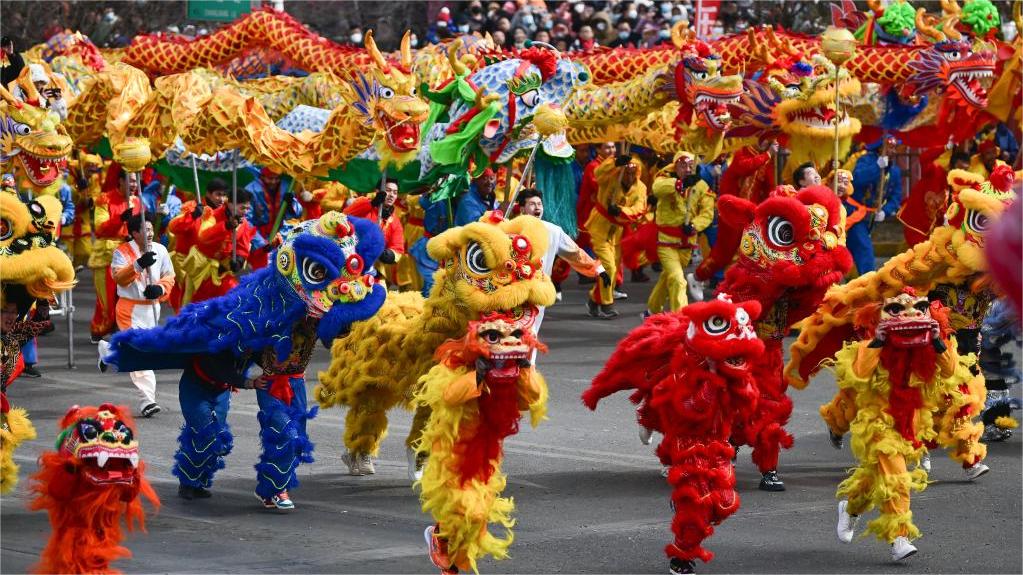Pet hotels do roaring holiday trade

A cat sits beside a photo frame at a pet boarding house in Beijing. [Photo/China Daily]
The first thing Lu Yan did after returning to Beijing over the weekend from a two-week Spring Festival visit to her hometown was to collect her "furry baby" and take the feline back to her apartment.
She had placed her 3-year-old cat, a British shorthair breed with white and gray fur, in a pet hotel before she left for Zibo in East China's Shandong province.
"Most of the time, I arrange pet boarding for my cat if I have to leave Beijing for long business trips or vacations," said Lu, who works at a publishing house.
If she has to leave Beijing for only a few days, she has someone come to her place at least twice a day to check on her feline friend. "It's less of a hassle this way, but for any absence longer than that I will definitely opt for a boarding service," Lu said.
She spent about 2,000 yuan ($278) during Spring Festival to have her cat — named "Seventeen "after Lu's birth date — well taken care of while she was away. Lu was pleased that there was someone at the pet hotel all the time to monitor the cat's condition, ensure it was safe, and play with it so it wouldn't get bored.
Lu has a membership with the company that runs the hotel and always books her cat a bigger room intended for two felines, which costs twice as much as a single room, so her pet has more space.
She was concerned the cat would be lonely on its own at home, and wouldn't receive speedy medical attention if it became sick.
Lu, aged in her 40s, adopted the feline for company in 2021 when pandemic control measures meant people's movements were restricted.
Spring Festival is a tricky time for pet owners like Lu who must find someone they trust to take care of their animals.
The number of pets in China was projected to increase to nearly 200 million in 2023, with dogs, cats and aquarium pets the most popular, according to the 2023 China Pet Industry Annual Report jointly released by the market researcher Euromonitor International and the Asia Pet Alliance.
The pet market was estimated to reach nearly 250 billion yuan in the same year, with pet services and related sectors to keep growing, the report said.

A view of the cat boarding rooms at Maotuotuo Hotel in Fangzhuang, Beijing. [Photo/China Daily]
Filling the kitty
Compared to pets like lizards and fish, which can survive in smaller spaces and require minimal daily interaction, cats and dogs are more active and need care, companionship and room to exercise, all of which have contributed to the rapid rise in pet care services.
Animal boarding services are in strong demand as more pet owners are willing to dig deep into their pockets for a quality environment for their furry companions.
According to corporate information provider Qichacha, more than 2,000 pet boarding businesses have opened in the past three years.
Some pet services also offer to monitor the health status of animals and allow them to roam and exercise daily, which eases the anxiety of some overly protective owners.
Wang Can, who heads operations at the Maotuotuo Hotel in Fangzhuang neighborhood, Fengtai district, Beijing, said their pet accommodation was fully booked three months before Spring Festival.
Her company has five venues exclusively for cats. The Fangzhuang one has 29 rooms of three different sizes, with daily accommodation prices for one cat ranging from 39 to 179 yuan.
"We are located in a quiet neighborhood away from the street chaos, and all of the rooms are separate and offer wooden furniture and DOAS(dedicated outdoor air systems)," Wang said, admitting that their target clients are not penny-pinchers.
The other four facilities, located in busy business hubs or densely populated residential areas, were also fully booked during Spring Festival.
"Most customers have signed up for membership and often seek our services when they have to leave home," Wang said.
"They can only stand to leave their cats alone for two to three days, and consider them in danger if it gets any longer," she added.
Many owners have a deep emotional attachment to their pets and some check around the clock with the hotel on their cat's welfare, Wang said.
In addition to regularly feeding the felines, giving them water and cleaning up their cat litter, employees play with them four times a day. If the feline has a health emergency, hotel staff must respond within 20 minutes, even if it's in the middle of the night.
Pet owners can also use their smartphones to view their pets in the hotel and can make requests for additional snacks and special dietary requirements, Wang said.
The hotel has more than 1,000 members, most of whom were born in the 1980s and 1990s. Wang stressed that the cats must have all the necessary vaccination certificates, be in good health, and recently dewormed to be accepted at their pet hotels. "This is to cut the risks of it (the pet) getting sick," Wang said.

A caretaker at a pet hotel ties a red scarf on a puppy on Feb 9. [YANG HUAFENG/CHINA NEWS SERVICE]
House calls
For customers who cannot book a room, Maotuotuo Hotel also offers house calls to check on pets. On one day during Spring Festival, they received more than 30 house call requests.
"We send the clients a message the moment we set out for their home and record everything from the moment we open the door," Wang said.
The service includes opening the windows for fresh air, cleaning the cat's living space as well as a health report about the cat's condition.
"We also have an AR (augmented reality) service if a client's home doesn't have a surveillance camera so real-time communications can be effectively conducted," Wang said, adding that a main objective is to ensure the safety of the customer's home.
The cost of pet boarding services in big cities ranges from tens of yuan to more than 100 yuan a day, depending on factors such as room quality, the size of the pet and additional services.

Lu Yan's cat is seen wearing a tiger-shaped hat after a bath. [Photo/China Daily]
Prices usually increase by around 50 percent during major holidays such as Spring Festival, said Kong Lingqi, who runs a pet grooming business in Tongzhou district in eastern Beijing.
"We received phone inquiries about boarding or home services a month before Spring Festival," Kong said.
Most of the inquirers were regular customers of Kong's shop.
Hong Tao, vice-chairman of the China Consumer Economics Society, said that pet-related consumption is a modern consumer phenomenon. The strong demand for pet boarding during Spring Festival is inevitable and businesses incur costs to provide services and must set prices based on supply and demand.

Pet caretaker Gan Shimeng (right) is given cats' information on Feb 3 in Liangjiang New Area in Chongqing. [ZHOU YI/CHINA NEWS SERVICE]
Regulations needed
The pet industry needs to be further regulated and establish industry standards to promote its sustainable development, Hong said. Related businesses also need to keep improving the quality of services to reflect the prices they charge, he said.
Wang Jiankun, a senior partner at Shanghai Hush Law Firm, said the pet boarding business is a civil contractual relationship between pet owners and caretakers.
Pet caretakers, as providers of the boarding services, should fulfill their obligations of proper care and custody.
He said that as consumers, pet owners should carefully select boarding services with proper qualifications that can provide suitable living spaces and facilities.
It's advisable to sign a written agreement, specifying responsibility for any problems during the boarding period, Wang added. In the event of an accident, compensation should be made according to the agreement.
For many migrant workers in big cities, taking their pets home for the Chinese New Year is often not an option due to public transportation restrictions on animals.
Even when pet transportation services are available, there is also the possibility of accidents, said Dong Wei, a senior veterinarian at a pet clinic in Beijing's Haidian district.
"This is especially true for cats, which are generally timid and are very likely to suffer a stressful response," Dong said.

Lu spent 2,000 yuan ($278) to board her cat, pictured, over the holiday. [Photo/China Daily]
She recommended that owners who have to leave home for a long period board their pets.
"They can be under observation, so any diseases can be detected and intervention done in time," Dong said.
"However, the pets must be properly vaccinated and have active antibodies for common diseases before they are put in a communal living environment," she added.
For owners who have to leave their pets at home, Dong suggested they set up a surveillance camera to monitor their behavior and deal with any emergency.
"Enough space should be available for them at home, and sufficient food and water should be prepared and within the pet's reach, along with some toys," she said.
House calls by friends or professional care should be arranged, especially for dogs, at least twice a day, Dong added.
Photos
Related Stories
- China's top court calls for responsible pet ownership
- Alcohol sales feast on holiday cheer
- As Spring Festival approaches, surging demand for pet care leads to price hikes
- Consumption booms during Spring Festival holiday
- China's economy booming during Spring Festival holiday
- Spring Festival holiday set to fuel economic rebound as cultural, tourism demands soar
Copyright © 2024 People's Daily Online. All Rights Reserved.









